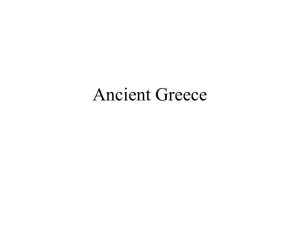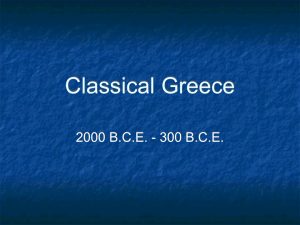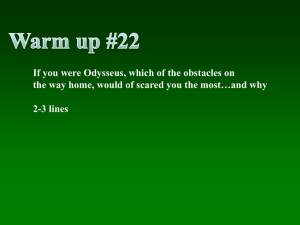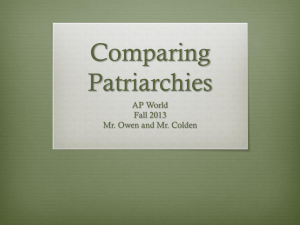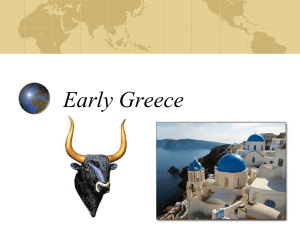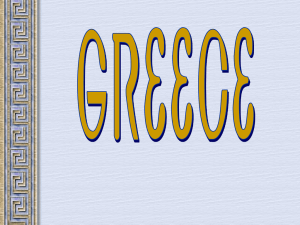Sparta
advertisement
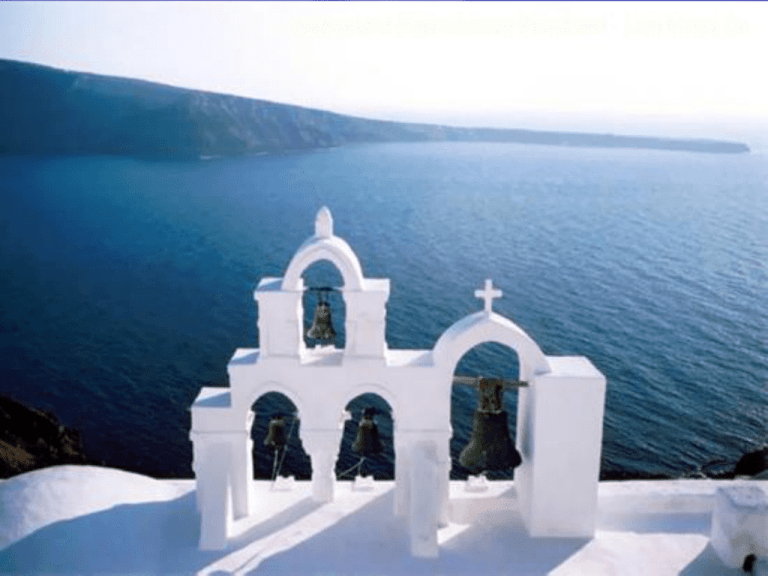
OBJECTIVES • Learn how people lived in Ancient Sparta • Discover some results of the Persian invasion of Greece • Understand the conflicts that the Athenian empire faced KEY TERMS • Sparta – a city state in ancient Greece • Helots – in ancient Sparta, the term for slaves who were owned by the state • Peloponnesian War – war fought between Athens and Sparta in ancient Greece; almost every other Greek city-state was involved in the war • Plague – a wide-spread disease • Blockage – an action take to isolate the enemy and cut off its supplies EARLY SPARTA • In early days, Sparta similar to other Greek cities • In 600 B.C. wars inside/outside of the city led to changes in government and life • Changed Sparta into powerful war machine • Established one rule – Always put city’s needs above your own LIVING IN SPARTA •Life in Athens free and open •Life for citizens of Sparta the opposite - harsh, cruel •Spartans tough, silent, grim •Only area in which Sparta matched Athens was in army, military realms EARLY SPARTA • Early in history, Spartans conquered land around their city • Turned the conquered people into helots – slaves owned by the citystates • Helots farmed all Spartan land • Spartans free to wage war • However, helots far outnumbered Spartans EARLY SPARTA • However, helots far outnumbered Spartans • In fear of revolt, Spartans turned city into armed camp and treated helots harshly GROWING UP IN SPARTA • Life at the hands of the government • Only healthy children raised • Wanted only healthy adults in society The Glory of Ancient Greece Athens and Sparta Chapter 7 – Section 2 GROWING UP MALE • At age 7, boys left home to live in barracks with other boys and begin military training • Training continued for next 13 years • By age 12, boys had spent long hours practicing with swords/spears • Owned one cloak and slept on thin mat GROWING UP MALE • Through rigid discipline, boys became superior soldiers • When 20 years old, young men officially became soldiers and remained soldiers until 60 years old GROWING UP MALE • At age 30, men took place in assembly – council consisting of all male citizens born in Sparta • Council approved decisions made by the council of elders, who, in turn, acted as advisors to the king GROWING UP FEMALE • Girls also trained and competed in wrestling/spear throwing • Girls not expected to become soldiers • However, Spartans believed that strong/healthy girls would grow into strong/healthy women who would bore strong/healthy children • So, unlike other Greek women, Spartan women trained to exercise and build up strength GROWING UP FEMALE • Spartan women had somewhat better life than other Greek citystate women • Allowed to own land, take part in business • However, like Athenian women, had to obey males (fathers, husbands, brothers) • Because men busy at war, women took on running farms & estates SPARTAN ATTITUDES • Spartans did not mingle with other Greeks • Not permitted to travel • Looked down upon those desiring wealth/engaged in trade • Lacked interest in arts • However, Spartan warriors known for skill & bravery SPARTAN ATTITUDES • However, Spartan warriors known for skill & bravery • Spartan fighting force played key role in Greek wars against Persians who lived across Aegean Sea, east of Greece SPARTAN WARRIORS THE PERSIANS INVADE • Most Greek history tell of wars Greeks fought amongst themselves • However in 400 B.C., Greeks put aside their differences, joined forces to defend their peninsula against Persia. EXPANDING PERSIAN EMPIRE • Cyrus the Great had founded the Persian Empire in the mid-500s B.C. • Cyrus and the rulers who followed him extended the original empire • By 520 B.C., Persians had gained control of Greeks colonies on the west coast of Asia Minor BATTLE AT MARATHON • In 490 B.C, force including thousands of Persians landed in Greece • Persian soldiers gathered at Marathon about 25 miles north of Athens • The Athenians hastily put together small army but Persians outnumbered them 2:1 • For several days, armies stared tensely at each across the plain of Marathon BATTLE AT MARATHON • Without warning, Athenians rushed Persian who were overwhelmed at furious unexpected attack • By one (probably exaggerated) account, 6,400 Persians and 192 Athenians were killed • However, true that in short time, this time this tiny state had defeated the giant that had come to destroy it LEGEND OF MARATHON • Stories say that after battle at marathon, Athenians sent fastest runner to tell people of Athenian’s victory. • With chest heaving runner covered the distance to the city and shouted to the people “Rejoice! We have won.” • Then, he dropped dead • Actual distance from marathon to Athens 25 miles; today’s marathons 26 miles in honor of legend CONFLICT & ATHENIAN EMPIRE • More battles with Persian followed • As common enemy, Persia distracted Greek city-states from fighting one another • Briefly united, Greece drove away Persians CONFLICT & ATHENIAN EMPIRE • Victory over Persians increased Greeks’ sense of own importance • Thought gods favored them • Athens emerged from war as move powerful city-state • Influence spread over eastern Greece. CONFLICT & ATHENIAN EMPIRE • Athens joined other city-states in Delian League (name after island of Delos, where leagues treasury kept) • In time, these cities treated more as subordinates to Athens and not like allies • Athens came to dominate league and used it to create its own empire CONFLICT & ATHENIAN EMPIRE • Ironically, while Athens expanding empire and forcing other city-states to bow to its will, Athens came to champion political freedom at home • Athens did support democratic groups within other city-states, but focus on freedom for its people • Years following Perisan Wars were Golden Age of Athens - Chapter 6 SPARTA AND ATHENS AT WAR • Athens may have been democracy at home but it began to act unfairly toward other city-states. • Early on allies paid tribute to Athens to protect them if Persia caused more trouble • Later, Athens moved treasure from Delos to Athens and used money intended to defend allies, to build Parthenon and finance other projects. PELOPONNESIAN WAR • People began to fear & resent Athen’s power • Looked to Sparta, who had not joined alliance for protection • To counter Delian League, Sparta formed Peloponnesian League, named after Peloponnesus, the southern Greek peninsula where Sparta located • Sparta and allies fought Athens and allies Thus began the Peloponnesian War which lasted for 27 years PELOPONNESIAN WAR • Athens at great disadvantage in war • Sparta, located inland, could not be attacked from the sea • Spartans had to march north to attack Athens by land PELOPONNESIAN WAR • When Sparta invaded Athens, Pericles let people from surrounding countryside move inside city walls • Overcrowded conditions led to plague • Plague lasted 5 years and killed 1/3 of the people, including Pericles • Power struggle of those who sought to take Pericles’ place resulted in further destabilization of the government. THE FALL OF ATHENS • Athens never recovered from its loses during the plague • Worse yet, Sparta allied with Persia • In 405 B.C, Spartans and Persians staged blockade to cut off Athens's supplies • Spartans but off harbor for food shipments • Athenians, starved and decimated, surrendered in 404 B.C. THE FALL OF ATHENS • Athenians, starved and decimated, surrendered in 404 B.C. • Victorious Spartans knocked down wall of Athens • Destroyed navy and empire • Athens never dominated Greek world again THE SPREAD OF GREEK CULTURE Chapter 7 Section 3 OBJECTIVES • Learn how King Philip of Macedonia came to power and how Alexander the Great built his empire • Understand what role the conquests of Alexander the Great played in spreading Greek culture Key Terms • Barbarian – person who belongs to a group that others consider wild • Assassinate – to murder for political reasons • Alexander the Great – king of Macedonia; conquered Persia and Egypt and invaded India • Hellenistic – describing Greek history or culture after the death of Alexander the Great, including the three main kingdoms formed by the breakup of Alexander’s empire YOUNG ALEXANDER • Son of King Philip of Macedonia • Fine and eager student who wanted to learn as much as he could, especially about ideas and deeds of Greeks • Alexander thought of himself as Greek and spoke Greek language • However, people to the south did not accept Macedonian’s as Greeks YOUNG ALEXANDER • Alexander’s tutor was Greek philosopher Aristotle • Aristotle taught Alexander Greek literature, philosophy, science • Aristotle passed on strong feelings that Greeks were superior people who deserved to rule • Alexander’s role model was Achilles, hero of Homer’s Iliad • Alexander vowed to visit site of ancient Troy and lay wreath on tomb of his hero PHILIP COMES TO POWER • Before Philip came to power, Macedonia week & divided • Philip united Macedonia, formed alliances with Greek city-states by bribing…or threatening them • Built army even stronger than Sparta’s • With this, Philip captured one citystate after another PHILIP COMES TO POWER • Demosthens (dih MAHS thus neez), who was master of elocutions (art of public speaking) tried to warm Athenians of danger to the north “He is always taking in more, everywhere casting his net round us, while we sit idle and do nothing. When, Athenians, will you take the necessary action? What are you waiting for” PHILIP COMES TO POWER • In 338 B.C, Athens and Thebes at last joined forces to try to stop Philip, however they were too late • Philip gained control of all of Greece PHILIP COMES TO POWER • Like predecessors, Philip considered himself Greek • Philip dreamed of conquering rich city-states of Greece • Accomplished this with combination of diplomacy & military force Alexander Builds an Empire • After conquering Greece, Philip planned to attack Persia but was instead assassinated by a rival • At age 20, Alexander becomes king Alexander’s Conquests • Although young, Alexander already experienced solider • First invaded Persian Empire • Forged ahead to Asia Minor, Judea, Egypt, Babylon & Persian Empire then crossed Indus River into India Alexander’s Conquests • All this happened within 11 years • Established cities wherever he went • Named many after himself (Alexandria, Alexandropoulos, etc.) Alexander’s Last Battle • Alexander’s troops battle weary and refused to go further than Indus River • Alexander not happy, but agreed to turn back • Got as far as Babylon and died of fever in 323 B.C at age of 33 • His many conquests spread Greek culture far and wide Greek Culture Spreads • Death of Alexander = Death of Empire • 50 years & disorder resulted in split of kingdoms with one commander in charge of each – 1 Greece & Macedonia – 2 Egypt – 3 Persia Greek Culture Spreads • 100 years of fighting amongst themselves and their descendants followed • All attempting to amalgamate (ding-ding) and take over Alexander’s previous empire Greek Culture Spreads • Many Greek soldiers remained in new kingdoms • Traders, artisans followed, further spreading culture Hellenistic Kingdoms • Hellenistic – Comes from word Hellas, name Greek’s gave their land – Describes Greek history & culture after earth of Alexander the Great The Hellenistic Kingdoms • Alexander left defeated cultures in tact • Hoped local culture would mix with Greek • Did not happen in Hellenistic kingdoms • Cities of Hellenistic Kingdoms modeled after Greek cities – Greek kings, Greek leaders, Greek agoras, Greek temples, Greek theater, Greek language etc. Greek Culture in Egypt • Greatest of Hellenistic cities Alexandria in Egypt founded 332 B.C • Alexandria became capital of Egypt, grew famous for trade & business Learning Capital of Greek World • Alexandria boasted largest library in world, with half million scrolls • Scholars and writers from all over traveled to use library Math & Science • Math & Science flourished in Alexandria • Branch of math called Geometry developed by mathematician name Euclid • Started with basic mathematical laws then wrote step by step proofs of additional principles to help explain qualities of figures including squares, cubes, angles, triangle's cones Eratosthenes • Many Hellenistic scientists knew Earth was round • Scientist named Eratosthenes even calculated distance around earth and came up with result very close to today’s estimation Aristarchus • Scientist who rejected idea that is Earth center of universe • Believed sun center and earth revolved around it • Idea did not catch on and scientists continued with Earth-centered universe until A.D. 1500s Archimedes • Discovered concept of pulleys & levers to lift heavy objects • Boasted “Give me a lever long enough and a place to stand on, and I will move the Earth.”

